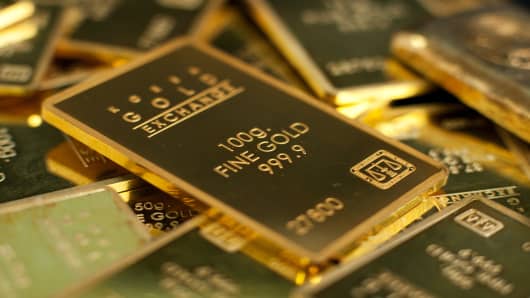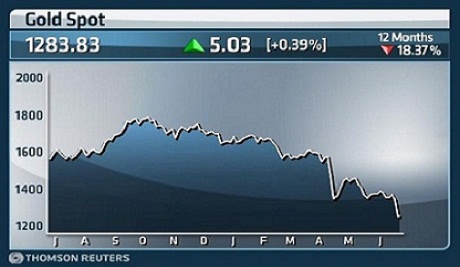Bullion suffered a heavy and historic two-day sell-off in April on worries about central banks selling their gold reserves. In all, bullion has declined more than 30 percent since its peak of around $1,900 in 2011.
"This is [not] the place where you step in and say 'this is the bottom for gold.' What we've been seeing is a lot of fear removed from the markets over the last two or three years, whether that's fear of inflation, which hasn't appeared from anywhere in the developed world, or fear of the break-up of the euro zone."
(Read More: Gold Falls to Near Three-Year Low as Investors Bail)
"A lot of those fears have been lessened and that means less reason to hold gold, particularly at a time when real interest rates are rising back into positive [real yields]."
Kendall added that even at $1,300 an ounce gold would be expensive relative to its market history and other assets.
As gold has lost its luster, retail investors who had piled into the commodity via popular exchange traded funds (ETFs) in recent years have been selling out.
(Read More: Here's Why Gold Is Getting Crushed)
"[ETF selling] gives you a reflection of what institutional investors and what all other investors are doing, it's a very visible expression of more broad-based investor liquidation of gold and I don't think it's completed."
Gold bulls have pointed out that the sharp drop in prices had prompted a surge in buying of physical gold in Asia as consumers looked for bargains.
But Kendall said that physical buying had "tailed off quite significantly" and that the investors in Asia who had bought in April are now "sitting in positions that are out of the money."
(Read More: Gartman on Gold: We've Never Ever Seen Anything Like It)
Investments banks have been cutting their gold forecasts in recent months. Last week, UBS trimmed its 2013 gold price forecast by 10 percent, and on Monday, Goldman cut its 2013 forecast to $1,300 from $1,435.
"While a continuation of the re-pricing of Fed policies across assets seems the path of least resistance and would push gold prices lower, the magnitude of this re-pricing has been significant and assumes an earlier tapering of QE3 and hike in the Fed fund rate than our economists expect," Damien Courvalin and Jeffrey Currie from Goldman said in a note on Monday.
(Read More: Gold Now at Levels Worse Than April's Big Selloff)
"Medium term, we expect that gold prices will decline further given our U.S. economists' forecast for improving economic activity and a less accommodative monetary policy stance."
This Could Last Decades
Roger Knightingale, chief economist at RDN Associates, said the decline in gold could last for decades.
"I think this won't go on for a couple of quarters and not even for a couple of years, I think it might go on for as long as the bull trend lasted, in other words, a couple of decades," he told CNBC Europe's "Squawk Box".
Knightingale said although there was potential for gold to be boosted by potential liquidity injections from central banks in Europe and China, buying commodities should be at the bottom of an investor's list.
"I think commodities will tend to be at the bottom of that list. You'll look at the world economy and see it's in desperate straits and they'll say this is not the time for commodities."
- By CNBC's Holly Ellyatt, follow her on Twitter @HollyEllyatt




